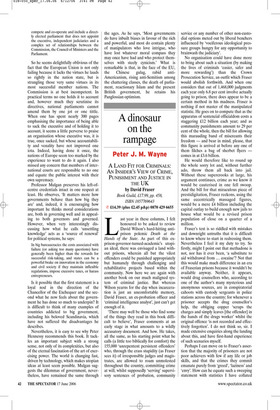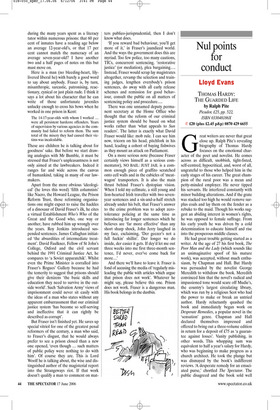A dinosaur on the rampage
Peter J. M. Wayne
A LAND FIT FOR CRIMINALS: AN INSIDER’S VIEW OF CRIME, PUNISHMENT AND JUSTICE IN THE UK by David Fraser Book Guild, £17.99, pp. 458, ISBN 1857769643 ✆ £14.39 (plus £2.45 p&p) 0870 429 6655 Last year in these columns, I felt honoured to be asked to review David Wilson’s hard-hitting antiprison polemic Death at the Hands of the State. As part of this exprison-governor-turned-academic’s utopian ideal, there was envisaged a land without prisons, wherein all but the vilest offenders could be punished appropriately but humanely through challenging and rehabilitative projects based within the community. Now here we are again with another book on our much maligned system of criminal justice. But whereas Wilson yearns for the day when incarceration is just an uncomfortable memory, David Fraser, an ex-probation officer and ‘criminal intelligence analyst’, just can’t get enough of it.
‘There may well be those who find some of the things they read in this book difficult to believe’, Fraser comments at an early stage in what amounts to a wildly accusatory document. And how. He takes, all the same, as his starting point what he calls (a little too biblically for comfort) the 155,000 ‘unrepentent persistent offenders’ who, through the crass stupidity (as Fraser sees it) of irresponsible judges and magistrates, are allowed to roam unmolested throughout the country, committing crime at will, whilst supposedly ‘serving’ supervisory sentences of probation, community service or any number of other non-custodial options meted out by liberal benchers influenced by ‘vociferous ideological pressure groups hungry for any opportunity to brainwash the judiciary’.
No organisation could have done more to bring about such a situation (by making the lives of criminals ‘easier, safer and more rewarding’) than the Crown Prosecution Service, an outfit which Fraser would abolish forthwith. And when one considers that out of 1,468,000 judgments each year only 6.8 per cent involve actually going to prison, there does appear to be a certain method in his madness. Fraser is nothing if not master of the manipulated statistic. He goes on to compute that as the apparatus of sentencial officialdom costs a staggering £12 billion each year; and as community punishments amount to 29 per cent of the whole, then the bill for allowing this marauding band of miscreants their freedom — and bear in mind, please, that this figure is arrived at before any one of them filches a bag of sherbet flyers comes in at £3.6 billion.
He would therefore like to round up the whole sorry lot and, without further ado, throw them all back into jail. Without these supercrooks at large, his argument continues, crime as we know it would be cauterised in one fell swoop. And the bill for that miraculous piece of prestidigitation, Fraser reckons, using the same eccentrically massaged figures, would be a mere £4 billion including the capital outlay to build enough new jails to house what would be a revised prison population of close on a quarter of a million.
Fraser’s text is so riddled with mistakes and downright untruths that it is difficult to know where to start in redressing them. Nevertheless I feel it my duty to try. So firstly, might I point out that methadone is not, nor has it ever been, ‘a substitute to aid withdrawal from ... cocaine’? Not that this would make much difference in an era of Fraserian prisons because it wouldn’t be available anyway. Neither, it appears, would drug counsellors who, according to one of the author’s many mysterious and anonymous sources, are in conspiratorial cahoots with custody sergeants in police stations across the country; for whenever a prisoner accepts the drug counsellor’s help, the obliging copper ‘scraps the charges and simply leaves [the offender] in the hands of the drugs worker’ whilst the original offence ‘is not recorded and effectively forgotten’. I do not think so, sir. I made extensive enquiries along the landing about this, and have first-hand experience of such scenarios myself.
Perhaps I can move on to Fraser’s assertion that the majority of prisoners are not poor achievers with few if any life or job skills, and that the crimes they commit emanate purely from ‘greed’, ‘laziness’ and ‘envy’. How can he equate such a sweeping statement with statistics I have collated during the many years spent as a literacy tutor within numerous prisons: that 60 per cent of inmates have a reading age below an average 12-year-old’s, or that 17 per cent cannot match the numeracy of an average seven-year-old? I have another two and a half pages of notes on this but must move on.
Here is a man (no bleeding-heart, lilylivered liberal he) with barely a good word to say about anybody. Fraser is, by turn, misanthropic, sarcastic, patronising, reactionary, cynical or just plain rude. I think it says a lot about his character that he can write of those unfortunate juveniles unlucky enough to cross his bows when he worked in one prison in Kent:
The 14-17-year-olds with whom I worked ... were all persistent hardcore offenders. Years of supervision by various agencies in the community had failed to reform them. The sum total of the misery they had caused their victims was incalculable.
These are children he is talking about for goodness’ sake. But before we start drawing analogies with Mr Bumble, it must be stressed that Fraser’s unpleasantness is not only aimed at the lawbreakers. Indeed it ranges far and wide across the canvas of humankind, taking in many of our lawmakers.
Apart from the more obvious ‘ideological’ (he loves this word) ‘fifth columnists’ like Nacro, the Howard League, the Prison Reform Trust, those reforming organisations one might expect to raise the hackles of a dinosaur of David Fraser’s ilk, he cites a virtual Establishment Who’s Who of the Great and the Good who, one way or another, have rubbed him up wrongly over the years. Roy Jenkins introduced suspended sentences. James Callaghan initiated ‘the absurdities of intermediate treatment’. David Faulkner, Fellow of St John’s College, Oxford and the civil servant behind the 1991 Criminal Justice Act, he compares to ‘a Soviet apparatchik’. Whilst even the Prime Minister is corralled into Fraser’s Rogues’ Gallery because he had the temerity to suggest that prisons should give their denizens ‘the basic skills and education they need to survive in the outside world’. Such ‘Salvation Army’ views of imprisonment could never sit easily with the ideas of a man who states without any apparent embarrassment that our criminal justice system ‘has become so self-serving and ineffective that it can rightly be described as corrupt’.
But Fraser isn’t finished yet. He saves up special vitriol for one of the greatest penal reformers of the century, a man who said, to Fraser’s disgust, that he would always prefer to see a prison closed than a new one opened, ‘even though ... such matters of public policy were nothing to do with him’. Of course they are. This is Lord Woolf he is talking about, the wise and distinguished author of the magisterial report into the Strangeways riot. If that work doesn’t qualify a man to comment on mat ters publico-jurisprudential, then I don’t know what does.
‘If you reward bad behaviour, you’ll get more of it,’ in Fraser’s jaundiced world. And the ways the government does this are myriad. Too few police, too many cautions, TICs, concurrent sentencing, ‘restorative justice’ (or mediation), plea bargaining.... Instead, Fraser would scrap lay magistrates altogether, revamp the selection and training judges, lengthen everybody’s prison sentences, do away with all early release schemes and remission for good behaviour, consult the public on all matters of sentencing policy and procedure....
There was one unnamed deputy permanent secretary at the Home Office who thought that the reform of our criminal justice system should be based on what works rather than ‘what appeals to Sun readers’. The latter is exactly what David Fraser would like: mob rule. I can see him now, tricorn on his head, pitchfork in his hand, leading a cohort of baying fishwives as they mount an attack on Parliament.
On a more serious note (because Fraser certainly views himself as a serious commentator), NO BAIL: JUST JAIL is a common enough piece of graffito scratched onto cell walls and in the cubicles of ‘meatwagon’ transporters. It is also the main thrust behind Fraser’s dystopian vision. When I told my cellmate, a still young and lion-hearted Irish traveller with two sevenyear sentences and a six-and-a-half stretch already under his belt, that Fraser’s answer to the crime problem was to adopt zerotolerance policing at the same time as introducing far longer sentences which he believes are ‘far more effective’ than any short sharp shock, John Jerry laughed in my face, exclaiming, ‘Der geezer’s not a full fuckin’ shillin’. Der longer we do inside, der easier it gets. If dey’d let me out three weeks into me first three-month sentence, I’d never, ever’ve come back for more...’ And there we’ll have to leave it. Fraser is fond of accusing the media of ‘regularly misleading the public with articles which argue that prison does not work’. Whatever he might say, please believe this one. Prison does not work. Fraser is a dangerous man. His book belongs in the dustbin.



















































































 Previous page
Previous page